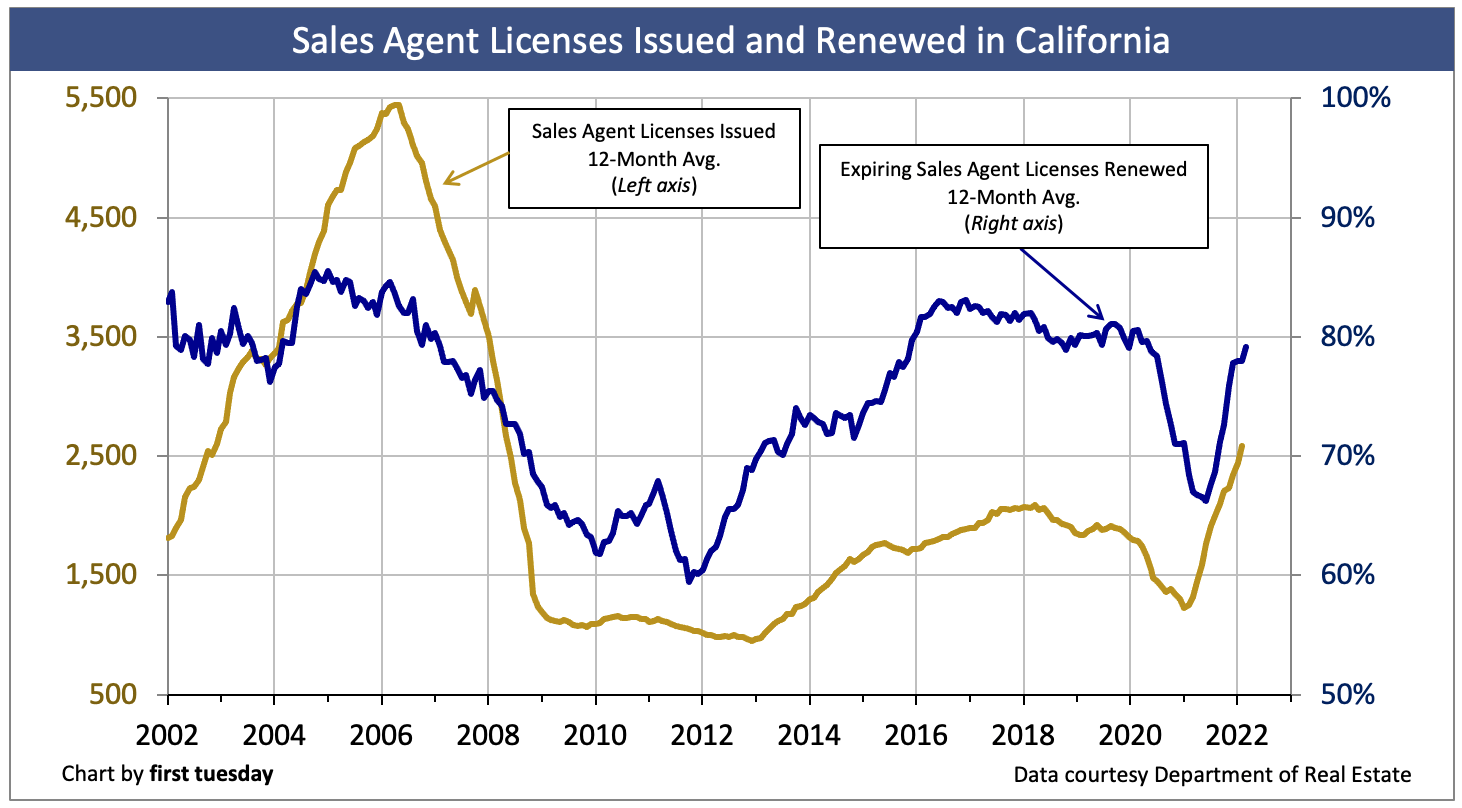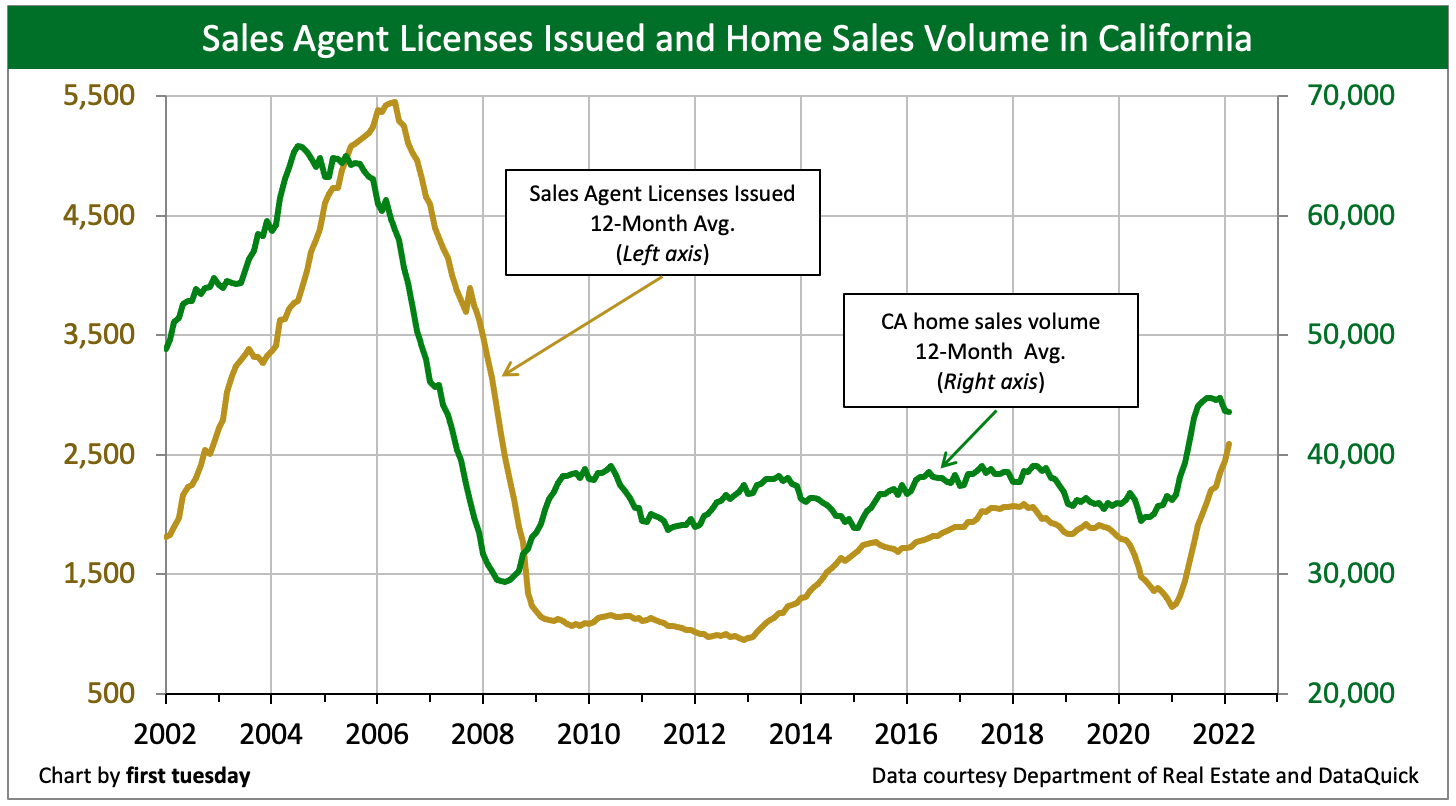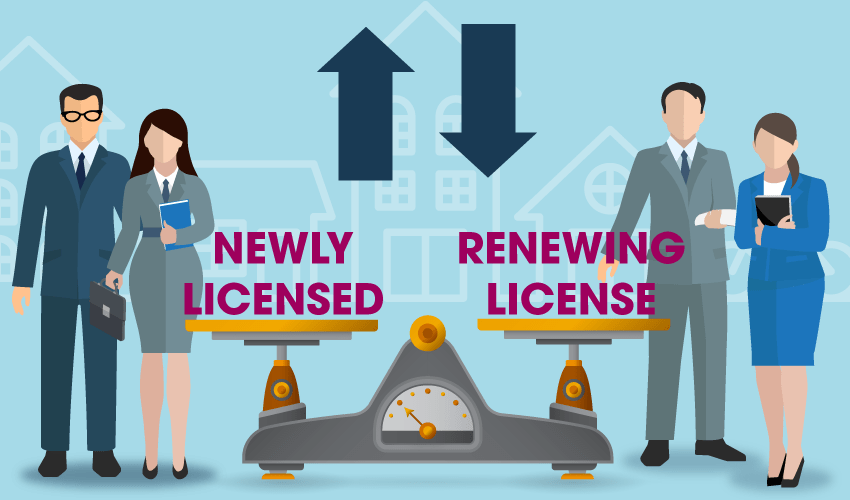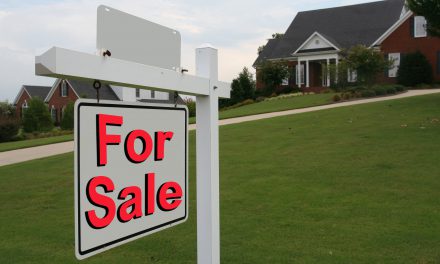Do you plan to renew your real estate license again?
- Yes (88%, 189 Votes)
- No (12%, 26 Votes)
Total Voters: 215
The number of new Department of Real Estate (DRE) sales agent licenses issued in February 2022 was just under 2,400, with a 12-month average of 2,600 new licensees entering each month over the past year. While the 12-month average remains significantly higher than in recent years, the number of new licensees arriving each month has passed its peak and is trending down in 2022.
License renewals have also been up in recent months, with an average of 79% of expiring sales agents renewing their licenses over the 12 months ending in February 2022, well above the 68% 12-month average of one year earlier.
The direct correlation between home sales volume and agent licensing shows licensing movement changes 6-12 months after a consistent change in home sales volume. Today’s higher renewal rate is directly related to the significant increases in home sales volume experienced in 2021, which opened the floodgates for agent fees.
A total of 305,600 agents and 128,300 individual brokers are currently licensed by the DRE. Expect the number of licenses issued to fall back throughout 2022-2023 due to downward pressure from rising interest rates, to cause sales volume and home prices to slip. The next substantial increase in sales agents won’t occur until the next boom in real estate sales volume and prices. This boom, expected to occur in the years following 2024, will see a Great Confluence of first-time homebuyers and cash-flush retiring Baby Boomers.
Updated April 21, 2022. Original copy released May 2014.
Chart 1

Chart update 04/21/22
| Feb 2022 | Jan 2022 | Feb 2021 | |
| Sales agent licenses issued | 2,400 | 2,200 | 1,700 |
| Expiring Sales agent licenses renewed | 80% | 85% | 64% |
Agent licensing and renewal activity fluctuates from month to month. However, the chart above displays a 12-month moving average of monthly licensing and renewal rates, offering a bird’s eye view of the larger trends.
So what causes above-average licensee turnover? One answer is that sales volume directly affects active agents’ income. Brokerage income has suffered heavily over the last several years as sales volume remained flat. Members of the public — the source of prospective agents — never hear about sales volume or how well agents are doing. Instead, the media is infatuated with pricing, touting the 10% and 20% year over year home price gains.
Sales agents become licensed
Chart 2

Chart update 04/21/22
The pricing narrative – which often attracts new licensees into the profession – excludes more telling data such as sales volume or the effect of rising mortgage rates. Thus, potential new arrivals see money to be made as prices spiral upward. For them, price momentum undoubtedly means success as a real estate agent is lurking in brokerage offices. Wrong footed, but that is where licensees, old and new, find themselves.
However, new licensees will slow to a trickle the moment stories emerge about falling prices, a near certainty as interest rates continue their rapid increase. The Federal Reserve (the Fed) intends to continue their upward pressure on mortgage interest rates through 2022-2023.
Editor’s note — The percentage of brokers renewing their license is consistently much higher than sales agents, with an average of 95% renewing over the 12 months ending March 2022. Considering the greater amount of education and experience required to obtain a broker’s license, it’s no wonder the vast majority choose to renew.
As seen in the chart above, the direct correlation between sales volume and agent licensing shows licensing movement changes 6-12 months after a consistent change in home sales volume. This lag time is due to the time period it takes for an agent to:
- complete the required education courses (a minimum of 54 days); and
- pass the agent exam (it takes an average of 1-2 months for DRE to process applications before an agent can schedule an exam).
When application volume is high, the DRE often experiences processing delays, lengthening the process. New licensing activity is high when the outlook for housing is good, and low during troughs in the housing market. The notable exception occurred following the housing crash, when sales volume rose in 2009, yet agent licensing remained flat. During this time, the word-of-mouth negative outlook on the housing market from the media (not to mention the collection of foreclosure signs on every street) deterred many potential licensees.
Agent licensing peaked in 2005 at over 6,000 new licenses issued in a single month. From 2010-2020, licensing hovered around 1,000-2,000 new licenses issued each month. Licensing recently bounced in 2021, likely due to media reports of rapid significant increases, coupled with pandemic-era employment doldrums.
Agent licensing to fall off
What is expected for agent licensing in 2022 and beyond? The number of newly licensed agents in Q1 2022 is showing signs of tapering off. Keeping afloat their numbers is the ongoing surge in home prices across all price tiers on top of a long upward trend here in California. Similarly, the overall number of DRE licensees has also increased.
But altogether licensing is starting to languish along with home sales volume in 2022 and will only decline until the next boom in home sales, expected in the years following 2023. Home sales and prices are expected to rise along with the Great Confluence of first-time homebuyers (members of Generation Y) and Baby Boomers retiring and downsizing.
The future of renewals is mixed
The road ahead for agent renewals is a bit more complex. That’s because renewal rates tend to fluctuate based on how long the agent has held a license.
For instance, first and second time renewals are less likely to renew than those who have held their license for 10+ years. These long-time agents are less likely to let their licenses go due to the hassles of getting licensed all over again if they decide to get back in. On the other side of the scale, Baby Boomers are set to retire in earnest, and many of the older generation will let their licenses expire. The exceptions are those who qualify for DRE’s 70/30 rule: if a licensee is 70 years or older and has been licensed in good standing for at least 30 continuous years, they do not have to complete continuing education as part of the renewal process. Thus, they are more likely to continue renewing well into their golden years.
Despite the many facets to forging a forecast for renewals, it’s safe to say that renewals will follow the same trend as licensing. That is, renewals rise following a period of increased home sales, and fall during times of depressed home sales. The only difference is the magnitude of change is lessened for renewals, as seen in Chart 1. That’s because licensees up for renewal know the lengths it takes to obtain a license – and they know choosing not to renew means all that hard work has gone to waste. Even if the housing market isn’t hot now, most will want to be licensed for when it picks up again (and it always does).
For a look at historical licensing trends, see first tuesday’s chart, Newly licensed agent and broker population.















Oops, I meant to check off the NO’ I will not let my license expire.